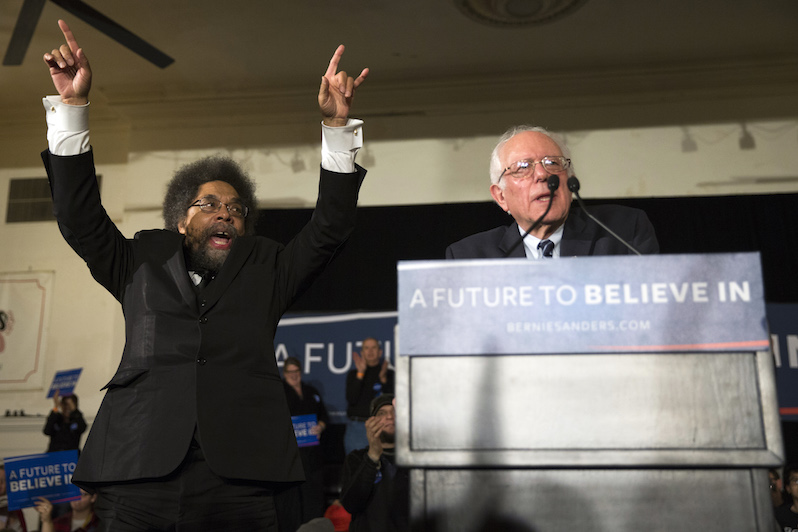Bernie Sanders’ Endgame Is an Opportunity for the Radical Left
The fundamental premise of Sanders’ campaign—that his “political revolution” can be accomplished within the confines of capitalism—is incorrect. That will soon be clear. Activist Cornel West, left, endorsed the Green Party's Jill Stein for president after supporting Bernie Sanders during his primary run. (Evan Vucci / AP)
1
2
3
Activist Cornel West, left, endorsed the Green Party's Jill Stein for president after supporting Bernie Sanders during his primary run. (Evan Vucci / AP)
1
2
3
Hillary, for her part, doubled down on her “realist” version of heartlessness — insisting that single-payer healthcare would “never, ever” happen and saying that free public higher education was somehow a giveaway to the wealthy (using Donald Trump’s children by way of example, as if either Ivanka Trump or Chelsea Clinton — whose friendship with Ivanka has been reportedly put on ice — were ever considering attending Penn State or CUNY instead of Penn and Stanford). As the primaries began, even as Clinton racked up (close) victories, the demographic splits were unbelievable. “Don’t trust anyone over 30” seemed to return emphatically.
As socialists, we have to give the Sanders campaign credit where it is due. In its intermediary phase, it performed better than anticipated and gave the radical left more room to maneuver than previously expected. It became a condensed expression of antineoliberalism and antiausterity and a pole of attraction that was amenable, if not consistently supportive, to socialist politics. The difficulties and contradictions existed — and still remain. Fredrik deBoer, in a review of Chris Hayes’ “Twilight of the Elites” in The New Inquiry, described a “typical American liberal” like this: “all Karl Marx in description, all Tom Daschle in prescription.”
This issue continues to confront us as the primary obstacle to successful politics — the gap between Sanders’ refusal to call himself a capitalist and his statement that the government “should not control the means of production” is not simply a rhetorical one by a politician very careful with his words. It responds to a genuine political dissonance, as seen in those who can identify capitalism as a source of great misery and inequity but cannot bear to face the obvious solution.
This internal conflict gives rise to deeply frustrating balancing acts. One of the forms that it takes is the bizarre parsing of size, as though the destructive capacities of capitalism are not built into its design but simply a result of its unchecked growth. This dovetails neatly with the fetishization of “small business” and denunciation of “monopolies.”
The problem, these “typical American liberals” believe, is not capitalism but its most gargantuan practitioners. We will downsize banks, they say, incentivize small-scale entrepreneurship, contain multinational capital, re-establish the priorities of national capital and so on. But leftists in this scenario will constantly be engaged in a rear-guard action against capitalism, chaperoning it and having to discipline it from time to time while otherwise leaving it to its own devices.
Another manifestation of this form of denial arises in liberals’ obsession with “corruption,” or the dreaded “buying” of the political process. This is the scourge of lobbyists, the Koch brothers, Sheldon Adelson, Goldman Sachs, the American Legislative Exchange Council and all the rest. Here, “corruption,” which is a politically value-neutral term (meaning not inherently a left-wing or right-wing position), stands in for a political program. Like the problem of “bigness,” the corruption problem is one of “dirt,” and what one must do is submit the political process to a baptismal cleansing. Federally funded elections, the overturning of Citizens United, financial transparency and “getting money out of politics” all herald a politics of authenticity.
Again, leftists in this scenario remain on the back foot. Getting money out of politics may curb “excesses,” but it will not fundamentally rearrange power relations. That would require its more frightening, redistributive (or, God forbid, expropriative) opposite: getting politics into money. Put succinctly, the billionaire class has too much money — whether they choose to spend it on political influence or not. We should not simply build roadblocks designed to entice them to spend it responsibly. We should spend it for them.
There is a reason this confusion exists, and the reason is that there is no viable or functioning political force arguing explicitly for a socialist political program. It is what the radical left is hoping to get out of the Sanders campaign and the millions of people whom it has revealed to have an affinity for a left-of-center platform. But the time is now, and we must value clarity.
The opportunistic straddling of social democracy and democratic socialism (not to mention revolutionary socialism) cannot be kept up forever. Not only is this unhealthy for a thriving radical left — which, understandable enthusiasm aside, cannot afford to recoil from critiquing Sanders’ massive political deficiencies, of which his embrace of American empire is particularly disastrous — but it dismantles the possibility of building the base for such a movement, which can only be built by honestly and sincerely articulating a coherent class consciousness.
While many are thrilled that, according to some measures, a majority of young Americans support “socialism” over “capitalism,” the significance of this majority changes when one considers what many of these young people think “socialism” is, describing it as essentially as Sanders does — as New Deal liberalism.
Your support matters…
SUPPORT TRUTHDIG
Independent journalism is under threat and overshadowed by heavily funded mainstream media.
You can help level the playing field. Become a member.
Your tax-deductible contribution keeps us digging beneath the headlines to give you thought-provoking, investigative reporting and analysis that unearths what's really happening- without compromise.
Give today to support our courageous, independent journalists.






You need to be a supporter to comment.
There are currently no responses to this article.
Be the first to respond.